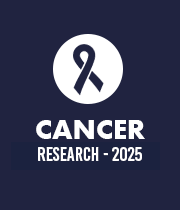Atif A Ahmed, University of Washington-Seattle Children’s Hospital, United States
RNA binding proteins (RBPs) are regulators of RNA metabolism and influence protein expression in various physiologic and pathologic conditions through regulation of RNA splicing, stability and translation. Several studies have demonstrated that RBPs play a role in cancer developm [....] » Read More

























Title : Will be Updated Soon..
Jianhua Luo, University of Pittsburgh, United States
Will be Updated Soon...
Title : Principles of oral rehabilitation in H&N cancer patients
Pietro Salvatori, Independent H&N Surgeon, Italy
Treatment goals for Head & Neck cancers can be indicated as: 1) Eradication of the tumor (ablative surgery or XRT, combinations), 2) Restoration of the anatomy (reconstructive surgery), 3) Rehabilitation of the function. Of course, the main goals are to increase survi [....] » Read More
Title : Will be Updated Soon..
Marika Crohns, Impactful Innovations Management Consultants LLC, United Arab Emirates
Will be Updated Soon...
Title : Colorectal cancer and associated risk factors: Case control hospital based study in Egypt
Ibrahim El Bayoumy, Consultant of public health-Ministry of Health, Kuwait
Background Colorectal cancer accounts for approximately 10% of all annually diagnosed cancers and cancer-related deaths worldwide.1 It is the second most common cancer diagnosed in women and third most in men. In women, incidence and mortality are approximately 25% lower than in [....] » Read More
Title : Importin7 induces M2 macrophage and promotes the progress of colorectal cancer by regulating the nucleus translocation of GRP78
Changjiang Yang, Peking University People's Hospital, China
Recent research has linked Importin7 to cancer aggressiveness and a dismal prognosis, but its function in colorectal cancer (CRC) is unclear. This study aimed to elucidate the clinical relevance, biological function, and potential molecular mechanisms of IPO7 in CRC. Our results [....] » Read More
Title : Cancer-associated fibroblasts derived soluble CADM1 predicts response to neoadjuvant chemoimmunotherapy in lung cancer
Jian Li, Shanghai Jiaotong University, China
Conventional neoadjuvant chemotherapy offers limited benefit for patients with resectable non-small-cell lung cancer (NSCLC). Recently, neoadjuvant chemoimmunotherapy (NCIT) has transformed perioperative management of NSCLC by priming systemic anti-tumor immunity before surgery, [....] » Read More
Title : Refined ypTNM staging for gastric cancer after neoadjuvant therapy based on optimal lymph node staging
Baolong Li, Fujian Medical University Union Hospital, China
Background: The 8th edition of the AJCC staging system for gastric cancer introduced the ypTNM staging. However, in clinical practice, we have observed that the accuracy of its prognostic assessment remains controversial. This study aims to develop a more precise and refined ypTN [....] » Read More
Title : Machine learning models based on preoperative contrast-enhanced CT radiomics for differential diagnosis of xanthogranulomatous cholecystitis and thick-walled gallbladder carcinoma
Qi Li, The First Affiliated Hospital of Xi'an Jiaotong University, China
Will be Updated Soon...
Title : Supramolecularly engineered bacteria-mediated innovative drug delivery for immunotherapy of tumors
Beibei Xie, University of Macau, China
Although various ferroptosis inducers including magnetic nanoparticles (Fe3O4) and iron-organic frameworks have been applied in cancer treatment, the mild immunogenicity, low targeting efficiency to the tumor, and poor tissue penetration have limited the therapeutic efficacy. Her [....] » Read More
Title : Elastin nanogel-encapsulated combo drugs for castration-resistant prostate cancer (CRPC) therapy
Vinoth Kumar Lakshmanan, Sri Ramachandra Institute of Higher Education and Research, India
Prostate cancer (PC) is the most common cancer affecting men and the third leading cause of cancer death. Despite recent advances in detection and localized curative treatment for prostate cancer, 23-40% of those patients will go on to develop metastatic disease. Castration-Resis [....] » Read More
Title : Flow cytometry for diagnosing malignant carcinomatous effusions
Namrata P Awasthi, Dr. Ram Manohar Lohia Institute of Medical Sciences, India
Background: The lecture will introduce the audience to commonly utilized techniques for Cytology of malignant fluids including cytospin, cell block and immunohistochemistry. The advantages and limitations of the techniques will be discussed. Further, basics of flow cytometry (FCM [....] » Read More
Title : The potential of Piper longum extract on breast cancer cell proliferation by inducing apoptosis
Shivam Singh, All India Institute of Medical Sciences, India
Background: The incidence of breast cancer has increased while the mortality rate has continued to remain high. Effective treatment of this disease is the key to survival. Therefore, this study is a necessity in continuing research into new effective treatments. According to anci [....] » Read More
Title : Survivin and its splicing isoforms gene expression in oral squamous cell carcinoma patients
Phyu Ou Maung, University of Dental Medicine, Myanmar
Background: Oral squamous cell carcinoma (OSCC) has become a major oncologic problem. Survivin overexpression in OSCC could be associated with increased aggressiveness, poor response to chemotherapy and prediction of patient survival. This study was conducted to analyze the mRNA [....] » Read More
Title : Chalepin suppresses cell growth by down-regulation of the epidermal growth factor receptor downstream pathways and induced cell cycle arrest in MCF7 breast cancer cells
Isah Musa Fakai, Kebbi State University of Science and Technology, Nigeria
The epidermal growth factor receptor (EGFR) pathway is an important signaling cascade currently investigated for its involvement in cancer therapy. In this study, chalepin isolated from Ruta angustifolia was evaluated for its down regulatory activity on the EGFR signaling cascade [....] » Read More
Title : Euxanthone suppresses the proliferation of human hepatocellular carcinoma cells via miR-199a-5p/E2F3 axis
Ahmed Al Awadh, Najran University, Saudi Arabia
Background: Hepatocellular carcinoma (HCC) is a leading cause of cancer-related mortality worldwide. This study aimed to evaluate the effects of euxanthone on the proliferation and migration of HCC cell lines and elucidate the underlying molecular mechanisms. Methods: HCC cell [....] » Read More
Title : Understanding the role of super enhancer MYCNOS-SE in chemoresistance of small cell lung cancer
Niu Yuchun, Oncology Hospital of the First People's Hospital of Foshan, China
Understanding the Role of Super-enhancer MYCNOS-SE in Chemoresistance of Small Cell Lung Cancer. Small cell lung cancer (SCLC) is a highly aggressive malignancy characterized by rapid progression and a high propensity for chemotherapy resistance. This presentation will discuss [....] » Read More
Title : BATF upregulates RGS2 expression to promote T cell exhaustion in lung cancer by activating the NF-kB pathway
Chanchan Gao, Southeast University Zhongda Hospital, China
Objective: This study aimed to investigate the role of RGS2 in immune regulation and its impact on the efficacy of PD-1/PD-L1 blockade therapy in lung cancer (LC), as well as to explore the regulatory relationship between RGS2 and BATF2 in modulating T cell exhaustion and tumor i [....] » Read More
Title : A novel treatment for advanced bladder cancer using microwave/radiofrequency ablation: Two successful cases
Yu Yang, Beijing Friendship Hospital, Capital Medical University, China
Introduction: Bladder cancer is one of the top 10 most common cancers. Although radical cystectomy (RC) is the standard treatment, it significantly compromises quality of life. This study explores percutaneous ablation as a main treatment combined with multimodal therapy as [....] » Read More
Title : ADGRE5+ CD8+ T cells overcome resistance to neoadjuvant immunotherapy in lung cancer
Jian Li, Shanghai Jiaotong University, China
Neoadjuvant immunotherapy with anti-programmed death-1 (neo-antiPD1) has revolutionized perioperative treatment for improving the overall survival (OS) of patients with early-stage lung cancer. Despite its transformative impact, neo-antiPD1 provides limited benefit to nearly 50% [....] » Read More
Title : Study of the participatory communication on good territorial governance performance in Tantan city, Morocco
Hefdhallah Al-Aizari, Ibn Tofail University, Morocco
Participatory and collaborative communication plays a crucial role in territorial governance to find innovative solutions for the proper functioning of public service. This study examines the importance of participatory and collaborative communication in good territorial governan [....] » Read More
Title : The impact of social marketing based intervention on educating esophageal cancer preventive behaviors
Davoud Shojaeizadeh, Tehran University of Medical Sciences, Iran (Islamic Republic of)
Esophageal cancer is one of the most widespread disease in Golestan Province , Iran. To identify risk factors a lot of research has been done. Because health workers have successful experiences of health education. The purpose of this study is to use social marketing to influence [....] » Read More